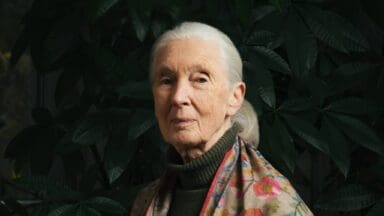
Throughout her life, Dr. Jane Goodall worked to raise awareness about threats to wildlife, promote conservation, and inspire a more harmonious, sustainable relationship between people, animals and the natural world. Throughout her life, she worked with unwavering passion and perseverance, right up until her death in California, where she was scheduled to deliver a speech at an upcoming event.
In addition to her remarkable 65-year study of wild chimpanzees in Gombe, Tanzania, Goodall was also a global advocate for human rights, animal welfare, species and environmental protection. Passionate about empowering young people to become involved in conservation and humanitarian projects and she led many educational initiatives focused on both wild and captive chimpanzees. Guided by her fascination with the mysteries of evolution, and Dr Goodall’s work was firmly founded in her staunch belief in the need to respect all forms of life on Earth.
Born Valerie Jane Morris-Goodall, Jane was the eldest daughter of businessman and racing car driver Mortimer Herbert Morris-Goodall and writer Margaret Myfanwe Joseph. Raised in Bournemouth, she was passionate about wildlife from early childhood and read avidly about the natural world.
In her book, Seeds of Hope, she accredits the natural surrounds of her upbringing for laying the foundations for her love of nature and life’s work. “Growing up in this idyllic home and landscape of England was the foundation of my lifelong love of the plant kingdom and the natural world.” There is no more compelling example of the importance to ensuring children have access to nature and green spaces, and the potential implications for the future.
Managing to save enough money waitressing, she travelled to Kenya, where she met the paleontologist Dr. Louis Leakey. Leakey employed her as a secretary at the National Museum in Nairobi. She subsequently spent much time with Louis and Mary Leakey in at the Olduvai Gorge in search of fossils and it was Leakey who asked Goodall to travel to Tanzania, to study families of wild chimpanzees in the forest of Gombe. In her work she developed a unique understanding of chimpanzee behaviour and made the ground-breaking discovery that chimpanzees use tools. Leakey also arranged for Goodall to study for a PhD in Ethology at Newnham College, Cambridge. Her doctoral thesis, The Behaviour of Free-living Chimpanzees in the Gombe Stream Reserve, was completed in 1965. Her three-month study evolved into an extraordinary research program, which is still ongoing today.
Goodall wrote an impressive, 27 books. Her latest, The Book of Hope: A Survival Guide for Trying Times, has been translated into more than 20 languages. Over the year she featured in numerous documentaries and films. In 2019, National Geographic opened Becoming Jane, a travelling exhibit focused on her life’s work, which is still touring across the United States.
She founded the Jane Goodall Institute (JGI) in 1977, initially to support the research at Gombe. There are now 25 JGI offices operating diverse programs around the world. In 1991, Jane founded Roots & Shoots, her global humanitarian and environmental program which encourages its young members to affect positive change for animals, the environment, and their local communities. The initiative began with just 12 high school students in Tanzania, but has since been active in over 75 countries. In 2017, Jane founded the Jane Goodall Legacy Foundation, to ensure the ongoing stability of the core programs she’d created.
Goodall was named United Nations Messenger of Peace in 2002 and made a Dame Commander of the Order of the British Empire (DBE) in 2024. Goodall was also awarded the United States Presidential Medial of Freedom, French Légion d’honneur, the Benjamin Franklin Medal in Life Science, Japan’s prestigious Kyoto Prize, the Ghandi-King Award for Nonviolence, The Medal of Tanzania, and the Tyler Prize for Environmental Achievement.
Throughout her life and remarkable career, she inspired generations of scientists, brought hope to countless people from all walks of life, and urged everyone to remember that “every single one of us makes a difference every day – it is up to us as to the kind of difference we make”. Her legacy continues with the ongoing research at Gombe, the community conservation program Tacare, the work of the sanctuaries Chimp Eden in South Africa and Tchimpounga in the Republic of the Congo, and Roots & Shoots empowering young people to become involved in hands on programs for the community, animals and the environment.
Amongst those paying tribute to Dr Goodall, was the former US president Barack Obama who he said, “opened doors for generations of women in science”. The UK Greenpeace Co-Executive Director, Will McCallum, said: “Dr Goodall’s legacy is not only in science but in the global movement she helped spark to protect nature and give hope for a better world.”

